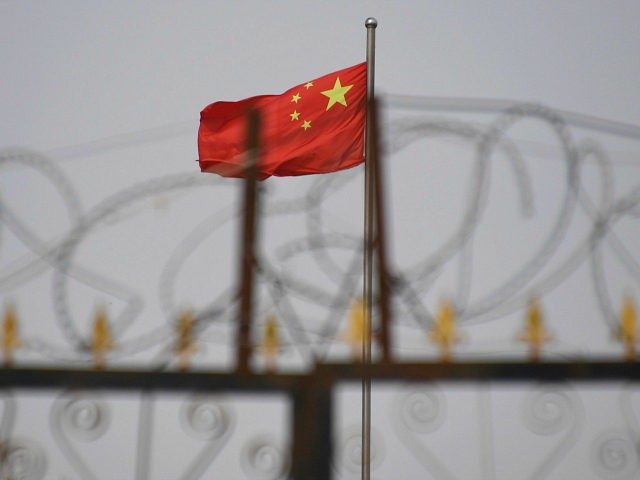Uyghur, Kazakh, and other ethnic minority survivors of China’s brutal concentration camp system told the BBC in an extensive report published Wednesday that they witnessed and endured rape at the hands of Chinese government agents on a regular basis, including the use of electric batons to rape and torture women.
China has been operating concentration camps in Xinjiang, its westernmost and largest region, since at least 2018. While estimates suggested as many as 3 million people were imprisoned in the concentration camp system at its peak, the most recent estimates from the U.S. government suggest a population of about 2 million people remain trapped there. The number dropped after reports that the Chinese Communist Party sold concentration camp victims as slaves to factories nationwide. Beijing officials claimed the missing prisoners had simply “graduated” from the camps.
China admits to building and maintaining the camps, but claims they are “vocational training centers” where members of local majority-Muslim ethnic minorities, particularly members of the Uyghur community, can learn the trade skills they need to compete with Han Chinese peers in the modern Chinese economy.
While survivors, including some cited in the BBC report, have for years testified to the systematic rape of Uyghur women in concentration camps, some of the harrowing testimony in the BBC’s exposé add new detail to the extent of the torture people in the camps suffered. A particularly gruesome claim is that Chinese Communist Party guards used electric batons to rape women, then electrocute them from the inside.
Tursunay Ziawudun, one of the survivors who spoke to the BBC on the record, said she endured 9 months in a concentration camp and endured torture and gang-rape routinely. The rape of women occurred “every night” in the camp, she said, and other women could hear the screams of agony from their rooms while they awaited their turn. Describing one instance, Ziawudun stated that she watched a woman go into the torture chamber before being taken herself.
“The woman took me to the room next to where the other girl had been taken in. They had an electric stick, I didn’t know what it was, and it was pushed inside my genital tract, torturing me with an electric shock,” she explained. “They don’t only rape but also bite all over your body, you don’t know if they are human or animal … They didn’t spare any part of the body, they bit everywhere leaving horrible marks. It was disgusting to look at.”
Another woman, Qelbinur Sedik, an ethnic Uzbek, told the BBC that she witnessed “gang rape” and regular electrocutions, offering a similar testimony to Ziawudun’s. She described four kinds of electric torture: “the chair, the glove, the helmet, and anal rape with a stick.”
“Yes, the rape has become a culture. It is gang rape and the Chinese police not only rape them but also electrocute them. They are subject to horrific torture,'” Sedik elaborated.
The Chinese guards often used ethnic minority women in their rape and torture of the others, according to the report. Another woman who spoke to the BBC said she was forced during her year and a half in the concentration camp to disrobe and restrain rape victims prior to the attacks.
“My job was to remove their clothes above the waist and handcuff them so they cannot move,” the Kazakh woman, Gulzira Auelkhan, said. “Then I would leave the women in the room and a man would enter — some Chinese man from outside or policeman. I sat silently next to the door, and when the man left the room I took the woman for a shower.”
Auelkhan said that the men committing the rapes did not appear to be guards in the prison, but clients — suggesting the Chinese government is making a profit from systematic gang rape.
The rapists, Ziawudun said, always wore masks.
The Chinese Communist Party has repeatedly denied these claims and did so again Wednesday, following the publication of the BBC report.
“People of all ethnic groups in Xinjiang live in peace and contentment, unity and harmony, and … all their legal rights are effectively guaranteed,” Chinese Foreign Ministry spokesman Wang Wenbin said Wednesday. “The BBC report on alleged abuses of women’s rights in Xinjiang you mentioned has no factual basis at all. There are simply no ‘re-education camps.'”
Wang went on to accuse the survivors of the camps of being “actors.”
On Thursday, Wang boasted of a propaganda initiative Beijing organized at the United Nations titled “Xinjiang Is a Wonderful Land.” Wang said concentration camp survivors discussed their happy lives in the camps in videos shown at the event.
“Representatives of graduated trainees from former vocational education and training centers appeared at the event and told stories of how they were influenced by extremism and how their lives have been changed after learning skills and graduating from the centers,” he said.
During the same press briefing, asked again about the BBC allegations, Wang denied the existence of the concentration camps and called them “schools.”

COMMENTS
Please let us know if you're having issues with commenting.